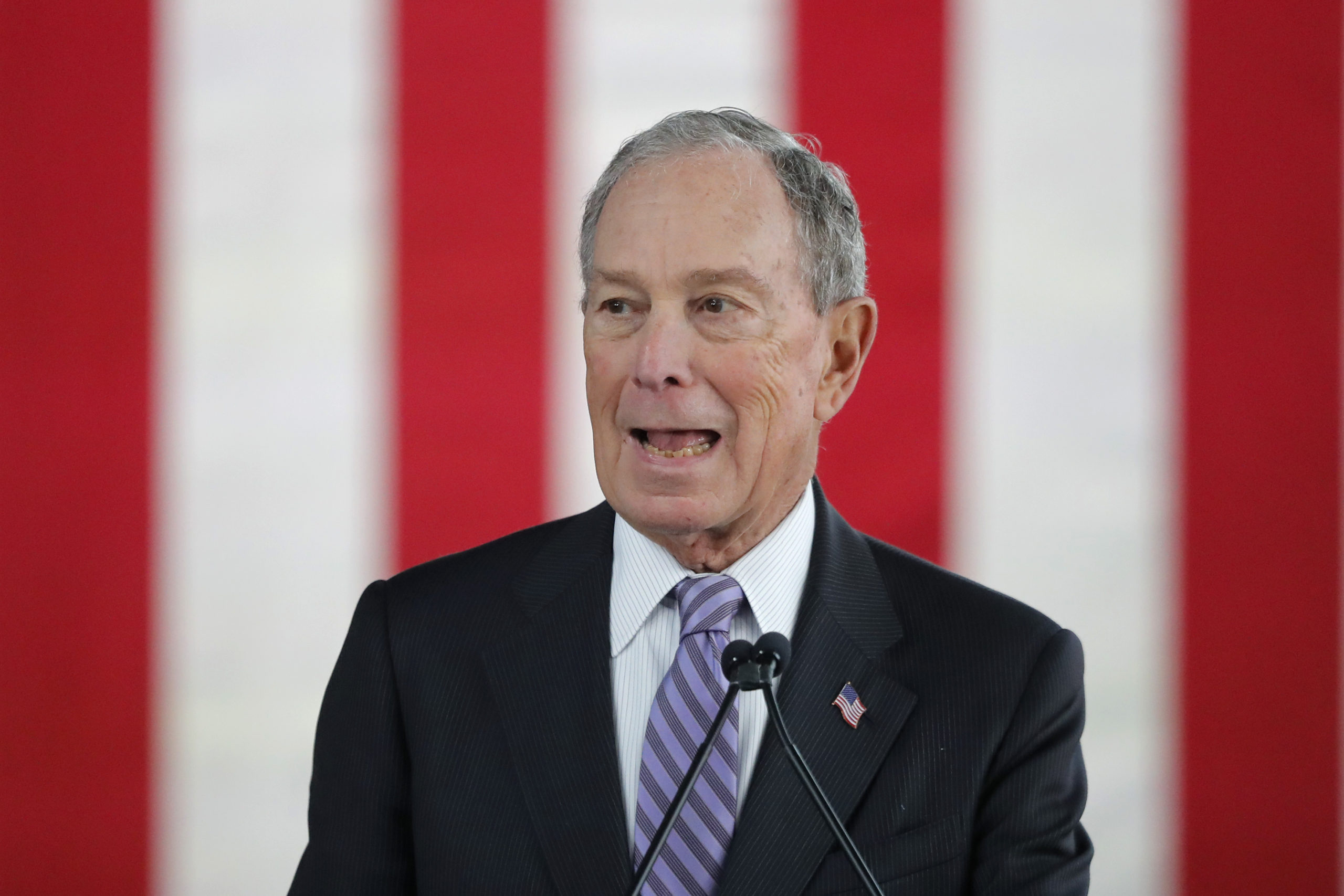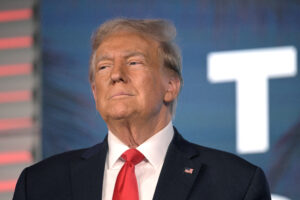Democrats Have Found Their Own Autocrat
His brand of authoritarianism may be more palatable, but Michael Bloomberg is no less contemptuous of democracy than Donald Trump. Democratic presidential candidate and former New York City Mayor Mike Bloomberg. (Gerald Herbert / AP)
Democratic presidential candidate and former New York City Mayor Mike Bloomberg. (Gerald Herbert / AP)
Since Donald Trump captured the Republican nomination four years ago, mainstream media across the political spectrum have warned us about the rise of “populism.” The standard narrative goes something like this: those on the political extremes — especially the far-right but also the far-left—are rapidly gaining ground and subverting liberal democracy across the globe, ushering in a new age of authoritarianism.
“What is spreading today is repressive kleptocracy, led by rulers motivated by greed rather than by the deranged idealism of Hitler or Stalin or Mao,” explained former George W. Bush speechwriter turned #Resistance leader David Frum in 2017. “Such rulers rely less on terror and more on rule-twisting, the manipulation of information, and the co-optation of elites.”
When it comes to right-wing nationalists like Trump and others — Hungary’s Viktor Orban, Brazil’s Jair Bolsonaro and Italy’s Matteo Salvini, to name just a few — this critique has largely proved correct. Trump’s authoritarian impulses are undeniable, and he has expressed his fundamental disdain for democratic norms, the free press and the rule of law on an almost daily basis. The former game show host has done extraordinary damage to America’s already deeply flawed institutions, and there’s no telling how much more he would do with another four years in office.
Whatever truth there is to this argument, however, there has always been something deeply disingenuous about veteran neoconservatives and neoliberals positioning themselves as defenders of democracy. Some of the loudest critics of this “new authoritarianism” were devoted supporters of Bush II, who was arguably an even more effective demagogue than Trump. Along with Frum, Bill Kristol, Thomas Friedman, Jennifer Rubin, Max Boot and Jonathan Chait all supported the Iraq War and an unprecedented expansion of executive power. President Obama, of course, consolidated and strengthened that power by broadening the surveillance state that is now under Trump’s control. None of the aforementioned pundits felt compelled to speak up about these developments before 2017.
It’s not so much Trump’s authoritarianism that centrists object to then but the crude and impudent manner of its implementation. Three years after his election, they still regard him as a kind of aberration. Never has this been clearer than in the mainstream media’s recent embrace of Michael Bloomberg. With former vice president Joe Biden’s campaign in a death spiral, the former mayor of New York City has emerged as an appealing alternative for establishment types who despise Trump but cannot bear the thought of supporting a genuine social democrat like Vermont Sen. Bernie Sanders.
The irony is that Bloomberg fits perfectly into Frum’s definition of authoritarianism, which he argues is built on “rule-twisting, the manipulation of information, and the co-optation of elites.” Not only does the billionaire own a media outlet that bears his name, but as his purchased endorsements make clear, he’s all too willing to subvert our political system for his personal gain. Indeed, he has staked his entire candidacy on his ability to do just that.
Bloomberg is notorious for disregarding rules and norms, infamously strong-arming New York’s City Council to overturn the mayorship’s term limits so that he could run for a third term. “Rules, in the Bloombergian universe, only apply to people with less than ten zeros in their net worth,” observed Joel Kotkin in The Daily Beast last month, adding that he is a “far more successful billionaire with the smarts, motivation and elitist mentality not only to propose but actually carry out his own deeply authoritarian vision should he be elected president.”
As mayor of New York City, Bloomberg governed as an authoritarian, from his draconian and racist stop-and-frisk policy to his heavy-handed crackdown on Occupy Wall Street. “I have my own army in the NYPD, which is the seventh biggest army in the world,” Bloomberg once bragged. While evicting Occupy protesters from Zuccotti Park in 2011, he even made sure to prevent journalists from documenting police brutality, closing airspace in lower Manhattan to block any possible aerial footage.
The former mayor’s disregard for civil liberties and disdain for popular movements is a matter of public record. But whereas Trump’s behavior is almost atavistic, Bloomberg employs what The New Republic’s Alex Pareene calls a “polite authoritarianism.” Comparing the two, Pareene writes that the latter “has explicitly argued that ‘our interpretation of the Constitution’ will have to change to give citizens less privacy and the police more power to search and spy on them. In fact, he does not seem to believe that certain people have innate civil rights that the state must respect.”
That so many talking heads have rallied around somebody like Bloomberg as an alternative to left- and right-wing populism should come as no surprise. A paper from political economist David Adler indicates that contrary to the dominant media narrative, centrists are uniquely hostile to democratic values. “Respondents at the center of the political spectrum are the least supportive of democracy, least committed to its institutions, and most supportive of authoritarianism,” writes Adler, whose findings were based on data from the World Values Survey and European Values Survey.
Per his research, less than half of self-identified centrists in the U.S. believe that free elections are “essential to democracy.” Perhaps more troubling, they tend to view basic civil rights as non-essential. While dissatisfaction with democracy is high on both the left and right, Adler is careful to point out that this does not necessarily indicate these groups are ready to abandon it altogether; rather, they want their government to be more democratic than they are at present. There is a difference, he notes, between support for democracy and satisfaction with existing institutions. And while he found “moderate levels of satisfaction” with the current system among centrists, they are the least disposed toward democratic reforms.
What these people fear and abhor, ultimately, is any kind of threat to the status quo and the entrenched power of elites. As Jeet Heer recently argued in The Nation, those on the extremes of the political spectrum are more likely to criticize a state whose violence they frequently bear the brunt of, while centrists who are “safely ensconced in mainstream society and hold positions of high social status, are more likely to take an uncritical view of trampling on democratic norms, since they have the comfort of knowing that the authorities are unlikely to go after reputable figures.”
Bloomberg would govern as a well-mannered neoliberal autocrat, and his assault on American democracy would be more insidious—and perhaps more dangerous—than Trump’s in the long run. He let his mask slip last year when he commented that China’s Xi Jinping is not, in fact, a “dictator,” since he “has to satisfy his constituents or he’s not going to survive.” The Uighur Muslims currently residing in concentration camps might disagree, but then again Bloomberg never did care much about the civil liberties of Muslims or people of color.
Sanders, the current Democratic front-runner, offers a very different view of Xi. “In China,” he wrote in 2018 article for The Guardian, “an inner circle led by Xi Jinping has steadily consolidated power, clamping down on domestic political freedom while it aggressively promotes a version of authoritarian capitalism abroad.” Unlike Bloomberg and his toadies, Sanders is committed to expanding democracy and understands that the neoliberal status quo of the past several decades has fueled the rise of authoritarianism throughout the world today.
Here lies the crucial difference between those who denounce Trump from their armchairs and leftists who join popular movements fighting for radical change. With Bloomberg now set to challenge Sanders for the Democratic nomination, the divide couldn’t be starker. And for those who truly reject authoritarianism, the choice should be easy.
Your support matters…Independent journalism is under threat and overshadowed by heavily funded mainstream media.
You can help level the playing field. Become a member.
Your tax-deductible contribution keeps us digging beneath the headlines to give you thought-provoking, investigative reporting and analysis that unearths what's really happening- without compromise.
Give today to support our courageous, independent journalists.






You need to be a supporter to comment.
There are currently no responses to this article.
Be the first to respond.